
Community Study Circles
Supporting adults’ learning and income generating projects.
The Concept
The Study Circle program, which started in 2008, is not simply a programme for studying. The idea is that a group of adults come together to undertake some form of production which will generate income. Using materials from the book boxes delivered to the rural elementary schools, and with the help of our community officer, they learn how to work democratically to make group decisions and undertake production together, while gaining technical knowledge about their chosen activity.
Forty study circle groups were operational in late 2021, with a total membership of approximately 250, the majority of whom are women. The largest number of groups were involved in commercial goat rearing and vegetable gardens but 8 were raising chickens, three were producing crafts, and one has been trying fish farming.
Some of the groups have been badly affected by the closures for COVID, as transport has been restricted and markets for their produce became unavailable. But most have persevered. This is now largely past and all activities have resumed. Many, however, have suffered water shortages.
Severe drought conditions prevailed in the 2019-2020 rainy season, and while the 2020-21 season was very good, problems still persist. Some groups rely on boreholes which they must share with their entire community, while others are struggling with salinity.
But the study circles give them hope of making some improvements to their lives, so they have persisted and some have re-focussed. One craft group which was selling beaded handbags has expanded into producing dish-washing liquid and floor polish, which they will sell to the local boarding school. One of the goat groups has added tomato production, while others are growing fodder.
One of the aims of the study circles is to assist villagers who have always engaged in subsistence production to move into commercial activities so as to be able to purchase consumer items for their families, pay school fees and buy clothing for their children, and maintain and improve their homesteads. In other words, raise their standard of living by working in groups. In recent months considerable progress has been made in forming associations which will enable the groups to work together to commercialise more effectively.

Small grains produce from the Ntepe Study Circle in 2016
Projects of the Community Study Circles:
Vegetable Gardens:
Twelve groups are operating vegetable gardens. These grow leafy vegetables, onions, carrots, maize, sugar beans, tomatoes, primarily. Most of the vegetables are sold locally on a daily basis, meaning that the local community have access to fresh vegetables and the members themselves are able to provide vegetables to their families every day.
After making sales, they decide how to use the cash earned. Some is ploughed back to buy seeds and equipment; one group has built a small store house, others have purchased fencing. The remaining cash will be divided equally among the members. They can then pay school fees and purchase consumer items for the family.
Some groups also assist needy community members. One Study Circle sold $15-worth of vegetables four times a week in support of the Kindergarden school-feeding programme. Another group assisted four orphans with school stationery from the proceeds of their garden. Yet another group supported two elderly people with fresh vegetables three times a week.
Capacity of production is always limited by water supplies, as rains are erratic and borehole water levels frequently fall. This results in the members reducing the area under cultivation, alternating times of drawing water for crops, or sometimes going for days without watering. The result is lower yields or even total crop failure. Two groups have been helped by individual donors to acquire solar pumps, allowing them to greatly expand their production. Others have been helped with fencing.
One of the most successful nutrition gardens is Sibambene at Tshanyaugwe. After struggling for many years with a hand pump, they were fortunate to receive support in 2018 from a Swedish family who have provided a solar driven water pump. This has enabled them to have unlimited water supplies and their yields have increased dramatically. They have been able to rehabilitate some orange trees planted years earlier which had been starved of wate
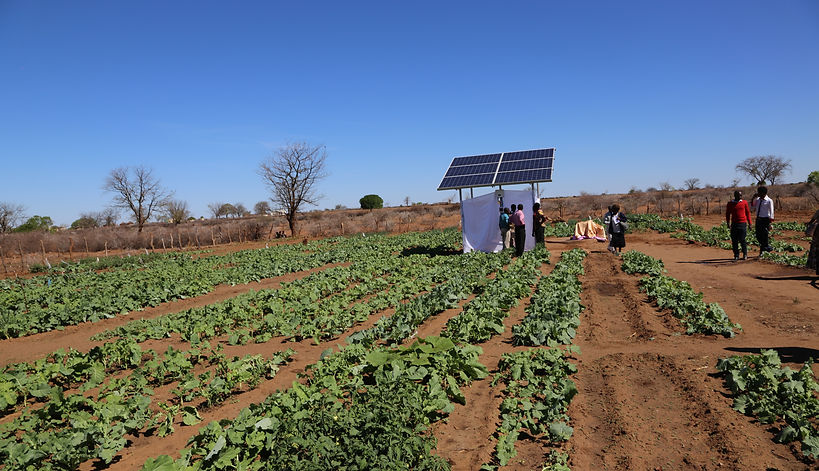
Solar-power to irrigate vegetables makes it possible to produce at commercial level
Goat Projects
Sixteen study circle groups are engaged in goat projects. Members rear traditional Matebele goats, which can produce one kid annually. The main expenditures are for fencing and for medicines to keep the goats healthy.
To mitigate the effects of food shortages, due to drought conditions, the goat-rearing groups grow fodder in their gardens. This supplementary feed for the goats improves the goats’ dietary levels and helps the nanny goats during their gestation period and after giving birth.
Through trainings attended by goat groups, the study-group members learn to keep healthy goats by vaccinating, dosing and dipping. Furthermore, fodder production by the groups impressed the Government Agricultural Extension Department, which has since engaged these groups to produce seeds to extend fodder production in other communities.
An important development in 2019 was the creation of a goat feedlot by ten study circles. They have built pens where they fatten the goats together, then sell them and share. Each group places up to 6 goats in the feedlot at a time. The photo shows the manager, one of the study circle members, who takes an extra share of the profit for managing the feedlot.
This project has the potential to substantially raise incomes, and has attracted the attention of a well-organised goat buying agency which buys for sale in Bulawayo butcheries.
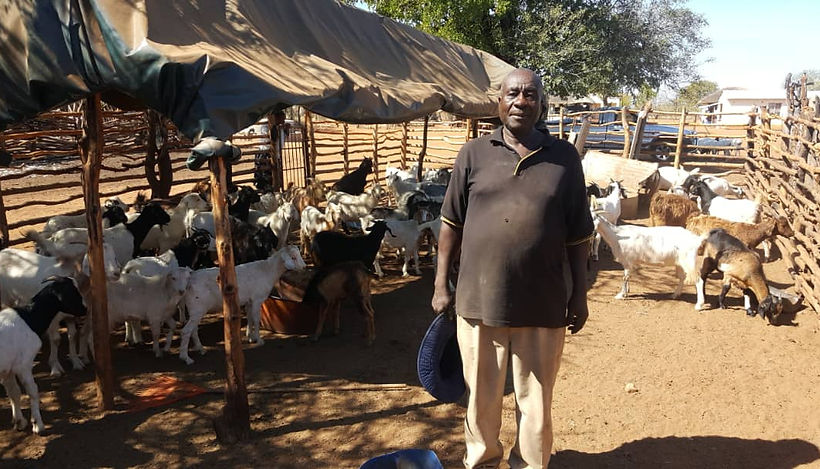
10 Study Circles that raise goats have come together to create a feedlot which increases the value of the goats for sale. They have hired a manager for the feedlot
Poultry Groups
Eight groups are involved in raising poultry. Three keep commercial chickens called broilers, while five raise the indigenous chickens which also have a developing commercial market in restaurants. They are said to have more flavor, and they do.
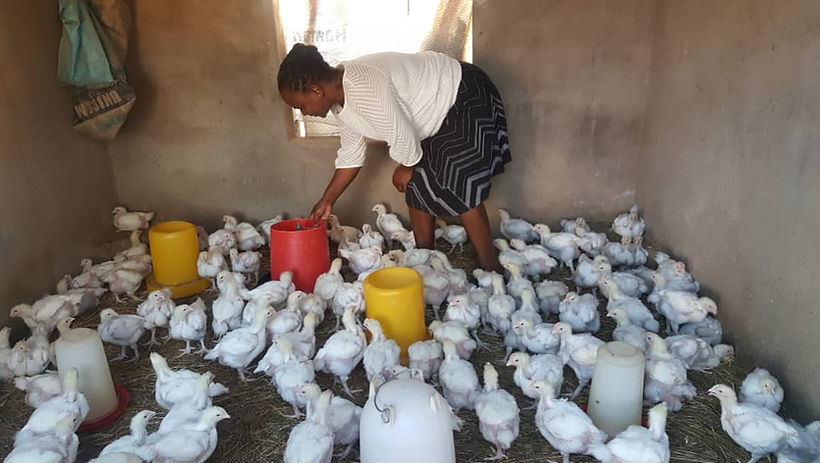
A member of one of the poultry groups feeding their chickens
Meetings and Discussions
Many meetings are held, focussing on planning, progress of projects, associations, conservation farming, small grains, food storage, fodder preparation, and malaria. Sometimes speakers are invited to talk about human rights issues such as violence against women; recently such meetings have addressed the challenges of COVID.
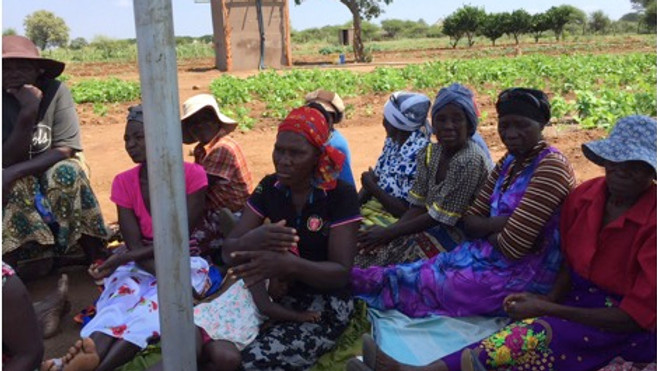
10 Study Circles that raise goats have come together to create a feedlot which increases the value of the goats for sale. They have hired a manager for the feedlot.
Farmers Association
The study circles have been at a disadvantage when selling their produce, as they are forced to take whatever prices they can get from buyers. As a result we have encouraged groups selling the same products to come together and market collectively. The aim is to form associations so that they work together and eliminate middlemen.
This is a developing process which we promote by organising workshops and supporting the formations of associations. Success is seen when vegetable producers in neighbouring communities come together to hire a truck to transport their crop.
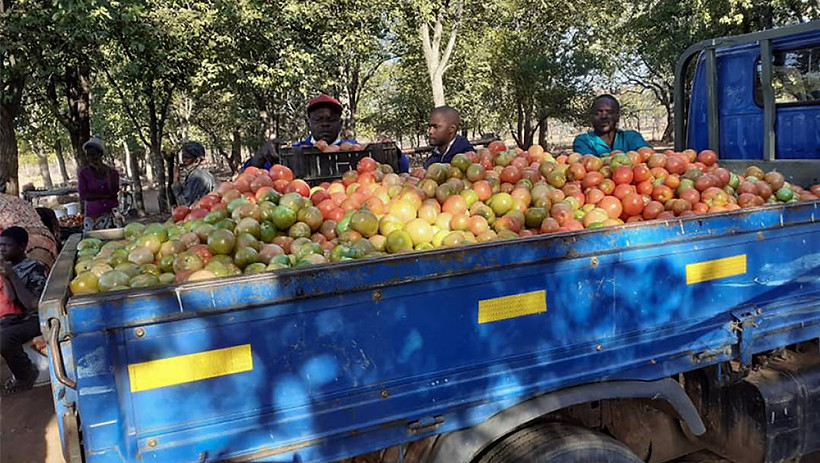
Tomato crop heading to market
We are very excited about the formation of these associations. They will bring farmers together and assist in the formation of economies of scale that will be instrumental in the marketing of their products. The associations will attract established and organized buyers rather than informal traders engaging in farm gate sales, thus increasing the profit margins of the farmers.
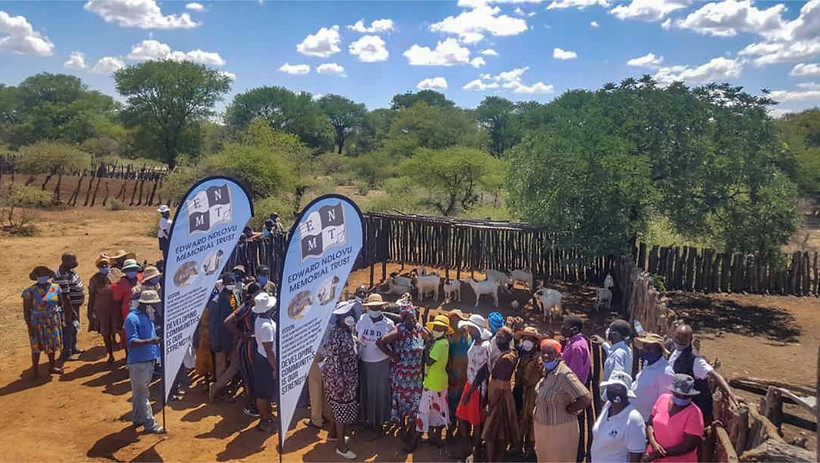
At the launch of Amohelang goat breeders association, composed of three study groups
Impact of COVID
We are very excited about the formation of these associations. They will bring farmers together and assist in the formation of economies of scale that will be instrumental in the marketing of their products. The associations will attract established and organized buyers rather than informal traders engaging in farm gate sales, thus increasing the profit margins of the farmers.
